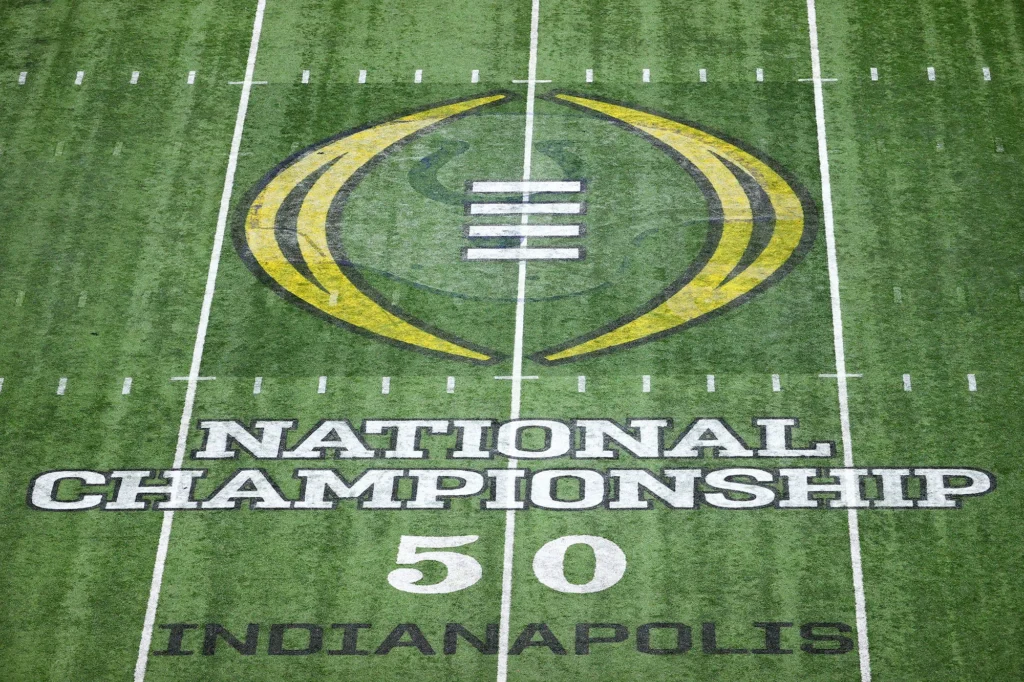The CFP decides to expand playoff and ruin the college football experience

A single camera panned away from a lone prison cell as the scene faded to black. Across the country, millions of households sat in disbelief as the credits rolled. Was this really the way the writers of the beloved Seinfeld show chose to end a near-perfect nine-season run?
Seinfeld wasn’t the first television show to end its series on a lackluster finale, and it certainly wasn’t the last. Recently in 2019, Game of Thrones, a show that rivaled Seinfeld in popularity, ended its series on a similar mixed bag of a finale according to its fans.
Fortunately, bad finales do not always ruin the television shows they terminate, but this may not be the case for college football.
Last Friday afternoon, news broke that the College Football Playoff presidents unanimously approved to expand the CFP to 12 teams in either the 2024, 2025, or 2026 seasons.
Make no mistake about it. This is a tragedy for college football.
For years, people who never truly understood what made college football so special have begged for the sport to be like their beloved National Football League.
“Why shouldn’t college football have a multi-team playoff like the NFL,” whined the casual fan. “Why shouldn’t we copy the NFL postseason and give more schools a shot at competing for a national championship?”
The answer is simple. Unlike the NFL, college football has never and will never be equitable because college football and the NFL play the same game but are vastly different sports.
In the NFL, the talent gap between teams is razor thin. Yes, there are franchises that are particularly worse than others, but on average, upsets in the NFL are not too uncommon to the point where those games almost can’t be considered upsets at all.
Proof of this concept lies in the sports gambling world among the Las Vegas spreads. Here, spreads between teams are tight, and it is rare to consistently see teams favored against others by more than a touchdown. This is not so in the college game where even teams in the same conference often end up with spreads of greater than 10 points.
There are many reasons for why the talent gap in the professional ranks is much thinner than in college, but chief among these is the fact that NFL talent is only spread out among 32 teams while the Division I Football Bowl Series of the NCAA currently boasts 131 teams.
131 teams is a far larger gap for talent to funnel through as opposed to 32. The NFL also punishes success. The further a team makes it into the postseason, the later their draft pick for the next season. Consistent success means consistently picking late in the draft while consistent failure means acquiring better talent by consistently picking earlier in the draft.
However, in college football the rich get richer since there is no penalty for winning. The NCAA does not impose scholarship restrictions on the University of Alabama simply because they always win, and the country’s best recruits will be more inclined to play for a team that’s always in the hunt for a national title rather than suiting up for the Toledo Rockets.
One might argue that this is a case for expansion. After all, if the University of Toledo has as equal a shot as the University of Georgia at making the CFP, wouldn’t five-star players be more inclined to play at schools outside of the college football blue bloods.
Unfortunately, this will never be the case as Toledo will never have the resources of Georgia or Alabama at its disposal. The booster clubs of Cincinnati and Boise State will never match the purses of Texas A&M and Miami. The facilities at the University of Central Florida and Marshall will always pale in comparison to the facilities of LSU and the University of Southern California.
An expanded playoff will never be the solution for any of the above. Instead, it will ruin the college football regular season, which many argue was previously the best regular season in sports, and it will kill a bowl system that was already on life support.
In the golden age of college football, the regular season functioned much like a playoff. One loss on the schedule, and your team was skating on thin ice. Suffer another loss, and your team was all but eliminated from contention.
In fact, there has only been one time in the history of having a national championship game that a team with two losses competed for and won a national title.
This feature gave an element to regular season games that was truly unique to the sport. It’s a system where every game on the schedule matters and lends the fans of college football much of their passion.
There is no scene in the NFL regular season that rivals an LSU-Florida game where everything is on the line, and how could it? The Falcons don’t enjoy losing to the Saints every year, but their season isn’t over because of that loss. In the Falcons’ case, their year ended as soon as the season kicked off.
Joking aside, I enjoy using the example of the 2018 Ohio State-Purdue game. It was a passionate game for Purdue fans who knew that their team was probably not good enough to make the four-team playoff but who wanted nothing more than to deliver a loss to spoil No. 2 Ohio State’s season. The Boilermakers did just that, and fans rushed the field in a frenzy. The Buckeyes were later left out of the playoff.
In a 12-team playoff format, that loss means nothing to Ohio State as they would still make the postseason, but, perhaps more importantly, Purdue’s win against its bitter rival also means less. Instead of enjoying the sweet taste of ruining Ohio State’s season, Purdue simply won a regular season game.
This is the world that the 12-team playoff creates. Unentertaining games that mean nothing in the aggregate.
Yes, you say. However, doesn’t Purdue winning that game prove that smaller teams could potentially pull off an upset in an expanded playoff format.
That is a point that I will grant proponents of the expanded playoff, but let’s not kid ourselves. Upsetting one team will not be enough for a lower-tier football program to win a title. Beating Ohio State is nice until you realize that your next game is against either Alabama or Georgia.
This is college football, not college basketball. If your program doesn’t have the scholarship athletes from your best player to your 85th best player that are better than college football’s tier one programs, your team will not consistently win games.
The college football bowl season is also ruined in this new format. Before the almighty CFP, college football formerly picked its championship game using the Bowl Championship Series format. Say what you will about the flaws of the BCS, but when there were only two teams that moved on to the title game at the end of each season, the bowl games meant far more.
Why wouldn’t they? If only two teams get to compete for a title, a bowl game, no matter what bowl it is, defined a team’s season. Now, seasons are defined by whether or not your team made the playoff. If your team didn’t, the season was a failure, and the chances were high that your team’s star players were going to decide to forego playing in the bowl game.
The 12-team playoff does not abate this, it exacerbates this. Now, the focus of fans and the media will truly be on those top 12 teams at the end of the season, and everyone else will be left to kick rocks.
Fewer, not more, teams will be labeled as successful programs in this format, and more star players outside of the 12 best teams will sit out bowl games.
Why sacrifice the aspects that made college football special? All so we can pretend that the Wisconsin Badgers or Iowa Hawkeyes have a chance at getting dismantled by Alabama, Georgia, Clemson, and Ohio State?
This is all a ploy at creating an illusion of equity that will destroy the greatest regular season in sports to hand out playoff participation trophies to the Minnesota Golden Gophers or the Washington State Cougars.
CFP presidents have created more wealth for themselves in an expanded playoff, and all they had to do to get fans to play along was reshuffle the same deck. The college football teams that fans are tired of seeing “win all of the time” will now be given the safety nets they need to ensure a playoff appearance every season.
A kick six loss against Auburn no longer has any meaning to Alabama who will be in the new playoff regardless of the outcome of one or two games.
Clemson will not need to worry about a potential loss to Wake Forest because the Tigers will have their postseason ticket punched.
This new system will not stop the teams that “always win.” It merely ensures that those teams will always have a shot to win. The expanded playoff does not “give smaller schools a chance.” The new system gaslights them into thinking their season will mean something while destroying all that was good about college football in the process.
The next few seasons will not be the series finale of college football, but rest assured that the camera is panning out on the sport. When the mistake is realized, it will already be too late. The passion that uniquely belonged to college football will vanish, and the credits will surely roll.
College football will always exist, but it will never be the same.







